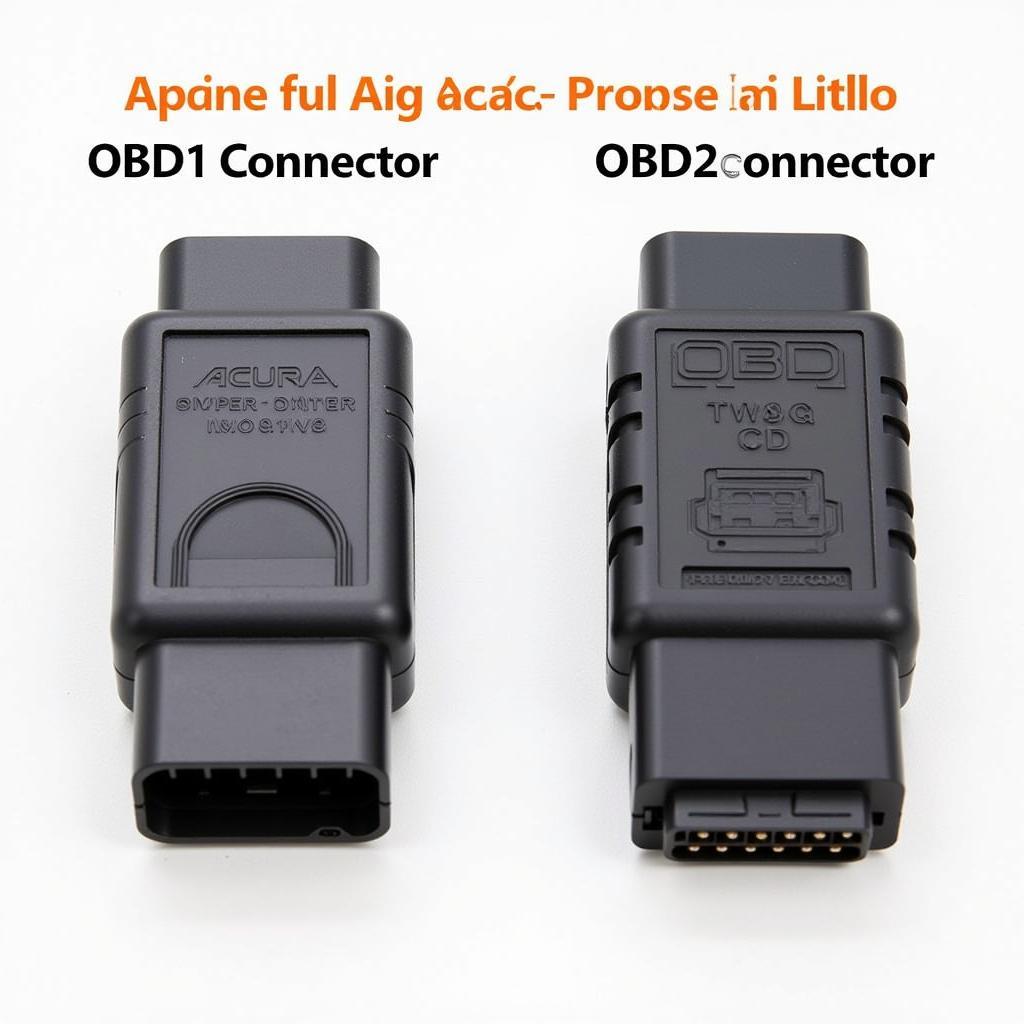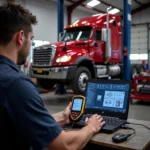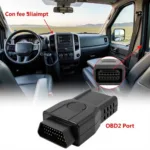The transition from OBD1 to OBD2 diagnostics in the automotive industry marked a significant shift towards standardized and more sophisticated emission control systems. For Acura owners with older models equipped with OBD1 systems, accessing the diagnostic capabilities of OBD2 can seem like a daunting task. This is where an OBD1 to OBD2 adapter comes in. This article will delve into the specifics of using an OBD1 to OBD2 adapter for your Acura, addressing common questions and concerns.
Understanding the OBD1 to OBD2 Transition in Acura Models
Before we delve into the adapter’s specifics, it’s important to understand why this transition matters. Acura, like many manufacturers, adopted OBD2 systems in the mid-1990s to comply with stricter emission regulations. OBD2 brought standardized diagnostic connectors, fault codes, and data protocols, making it easier for mechanics to diagnose and repair emission-related issues.
 OBD1 and OBD2 Connectors in Acura Models
OBD1 and OBD2 Connectors in Acura Models
However, this shift left older Acura models with OBD1 systems in a somewhat ambiguous position. While these vehicles are generally reliable, diagnosing issues can be more challenging without access to the standardized OBD2 system.
Why You Might Need an OBD1 to OBD2 Adapter for Your Acura
If you own an older Acura equipped with an OBD1 system, an adapter can be a valuable tool for various reasons:
- Code Reading and Clearing: While OBD1 systems have their own diagnostic codes, an adapter allows you to use a standard OBD2 scanner to read and clear these codes. This can be incredibly helpful as information about OBD1 codes can be scarce.
- Enhanced Diagnostics: OBD2 scanners offer more comprehensive diagnostic data compared to their OBD1 counterparts. This data can provide deeper insights into your Acura’s engine performance, emissions, and other vital systems, potentially helping you identify and address issues more effectively.
- DIY Repairs and Maintenance: For those who prefer handling their vehicle maintenance, an adapter and a compatible OBD2 scanner empower you to diagnose and address minor issues yourself.
Choosing the Right OBD1 to OBD2 Adapter for Your Acura
Finding the correct adapter for your Acura involves considering your specific model year and the type of OBD1 system it uses. Acura, like Honda, utilized a few different OBD1 connectors over the years.
Consult Your Owner’s Manual: Your Acura’s owner’s manual should provide information on the type of OBD1 system it uses. This is crucial for selecting a compatible adapter.
Research Online Forums and Communities: Acura enthusiast forums and online communities can be valuable resources for finding adapter recommendations specific to your model year.
Consult with a Specialized Mechanic or Retailer: If you’re unsure, seeking guidance from a mechanic specializing in Acura vehicles or a reputable automotive parts retailer can help you make the right choice.
Using the OBD1 to OBD2 Adapter
Once you’ve acquired the correct adapter, using it is a relatively straightforward process:
- Locate Your Acura’s OBD1 Connector: The OBD1 connector in Acura models is typically located under the passenger side of the dash or beneath the steering column.
- Connect the Adapter: Plug the adapter firmly into your Acura’s OBD1 connector.
- Connect Your OBD2 Scanner: Connect your OBD2 scanner to the adapter’s OBD2 port.
- Power On and Begin Diagnostics: Turn your Acura’s ignition to the “On” position (without starting the engine) and power on your OBD2 scanner. You should now be able to access and retrieve diagnostic information.
Important Considerations and Potential Limitations
While an OBD1 to OBD2 adapter can be highly beneficial, it’s essential to be aware of potential limitations:
- Not All Functions May Be Supported: Depending on your Acura’s specific OBD1 system and the adapter used, not all OBD2 scanner functions may be fully supported.
- Adapter Quality Varies: The quality and compatibility of adapters can differ significantly. Investing in a reputable brand is recommended to ensure reliable performance.
- Underlying Issues May Require Professional Attention: While an adapter can aid in basic diagnostics, complex mechanical or electrical problems may still necessitate the expertise of a qualified mechanic.
Frequently Asked Questions (FAQ)
Q: Will an OBD1 to OBD2 adapter work on all Acura models?
A: No, compatibility depends on the specific OBD1 system used in your Acura model year. Consulting your owner’s manual or seeking expert advice is crucial.
Q: Can I use any OBD2 scanner with an adapter?
A: Most standard OBD2 scanners should work; however, some advanced functions might be limited.
Q: Can I leave the adapter plugged in all the time?
A: It’s generally not recommended. Removing it when not in use is advisable.
Conclusion
An OBD1 to OBD2 adapter can be a valuable tool for owners of older Acura models, bridging the gap between legacy diagnostic systems and modern OBD2 technology. By enabling access to OBD2 scanners, these adapters simplify diagnostics, empower DIY enthusiasts, and can potentially save you time and money on repairs. However, choosing the correct adapter for your specific Acura model year and understanding its capabilities and limitations is essential. For complex issues, seeking professional help from a qualified mechanic is always recommended.
Need assistance with your Acura’s diagnostics? Contact us on WhatsApp: +1(641)206-8880 or email us at [email protected]. Our team of experts is available 24/7 to help you.

